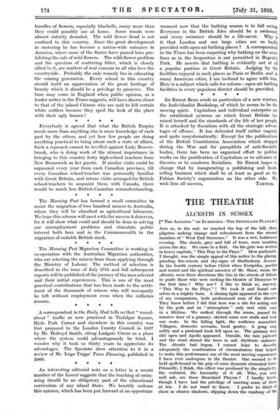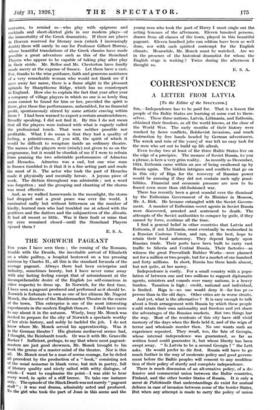THE THEATRE
ALCESTIS IN SUSSEX
[" THE ALCESTIS " OF EURIPIDES—THE STONELAND PLAYERS.] AND so, in the end, we reached the top of the hill, three pilgrims seeking change and refreshment from the eternal inanities of " West End Successes." It was a wet, boisterous evening. The clouds, grey and full of tears, were scudding across the sky. We came to a field. On the gate was written in heavy capitals, " This Way to the Plays." How preferable, I thought, was the simple appeal of this notice to the glaring, grinding fire-wheels and sky-signs of Shaftesbury Avenue, In the fourth century before Christ when Euripides, pacifist and ironist and the spiritual ancestor of Mr. Shaw, wrote the Alcestis, were there directions like this in the streets of Athens to guide those who were seeking the theatre of Dionysus for the first time ? Why not ? I like to think so, anyway. " This Way to the Plays" ! We took it and found our- selves in a mighty barn. A shining light appeared in the eyes of my companions, both professional men of the theatre. They knew before I did that here was a site for acting sent by the gods and an " atmosphere " only met with once in a lifetime. We walked through the arena, passed the massive door of a granary, skirted some cow stalls and took our seats. 'In the ailing light, the audience assembled. Villagers, domestic servants, local gentry. A gong rang softly and a profound hush fell upon us. The granary door Slid open and Apollo appeared. Outside, the rain pattered and the wind stirred the trees in sad, rhythmic cadences. The Alcestis had begun. I cannot hope to describe adequately the combination of circumstances that 'helped to make this performance one of the most moving experiences I have ever undergone in the theatre. One seemed to be held spell-bound in the grip of was dynamic elemental force. primarily, I think, this effect was produced by the simplicity, the restraint, the humanity of it all. Who, you may well ask, are these Stoneland Players ? I hardly know, tlioUgh I have had the privilege of meeting some of them at tea. I do not want" to -know. • I prefer to think of theni as elusive shadows; slipping down-the roadway of the
centuries, to remind us—who play with epigrams and cocktails and short-skirted girls in our modern plays—of the immortality of the Greek dramatists. If there are places in Heaven reserved for literary men (which I increasingly doubt) there will surely be one for Professor Gilbert Murray, whose beautiful translations of the Greek classics have made possible a great adventure such as this of the Stoneland Players who appear to be capable of taking play after play in their stride. Mr. Belloc and Mr. Chesterton have fondly made merry at the expense of Sussex. Let them have a care. For, thanks to the wise guidance, faith and generthis assistance of a very remarkable woman who would not thank me if I gave away her name, there is a flame alight in the pleasant uplands by Sharpthorne Ridge, which has no counterpart in England. How else to explain the fact that year after year a company of village players in which no one is so lowly that room cannot be found for him or her, provided the spirit is there, give these fine performances, unheralded, for no financial profit, spontaneously stirred by some artistic craving within them ? I had been warned to expect a certain amateurishness. Broadly speaking, I did not find it. By this I do not mean that all the players were imbued with what is vaguely called the professional touch. That were neither possible nor profitable. What I do mean is that they had a quality of feeling, a primitiveness, if you will, the spirit of which it would be difficult to recapture inside an ordinary theatre. The names of the players were (wisely) not given to us on the programme, but it would be churlish of me if I were to refrain from praising the two admirable performances of Admetus and Heracles. Admetus was a cad, but one wise man in Sussex- tumbled to it that it is a fine acting part and made the most of it. The actor who took the part of Heracles made it physically and mentally heroic. A joyous piece of work. The diction throughout was admirable ; not a word was forgotten ; and the grouping and chanting of the chorus was most effective.
And, as we walked homewards in the moonlight, the storm had dropped and a great peace was over the world. I ruminated sadly but without bitterness on the number of kindly, learned men who had troubled me at school with the genitives and the datives and the subjunctives of the Akestis. It had all meant so little. Was it their fault or mine that my eyes remained closed—until the Stoneland Players opened them ?
E. S. A.



































 Previous page
Previous page